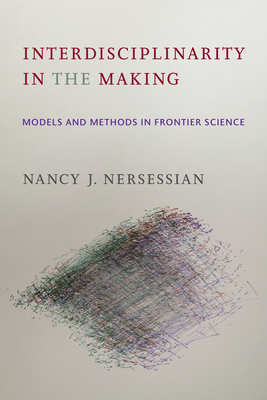Interdisciplinarity in the Making: Models and Methods in Frontier Science

Interdisciplinarity in the Making: Models and Methods in Frontier Science
A cognitive ethnography of how bioengineering scientists create innovative modeling methods. In this first full-scale, long-term cognitive ethnography by a philosopher of science, Nancy J. Nersessian offers an account of how scientists at the interdisciplinary frontiers of bioengineering create novel problem-solving methods. Bioengineering scientists model complex dynamical biological systems using concepts, methods, materials, and other resources drawn primarily from engineering. They aim to understand these systems sufficiently to control or intervene in them. What Nersessian examines here is how cutting-edge bioengineering scientists integrate the cognitive, social, material, and cultural dimensions of practice. Her findings and conclusions have broad implications for researchers in philosophy, science studies, cognitive science, and interdisciplinary studies, as well as scientists, educators, policy makers, and funding agencies. In studying the epistemic practices of scientists, Nersessian pushes the boundaries of the philosophy of science and cognitive science into areas not ventured before. She recounts a decades-long, wide-ranging, and richly detailed investigation of the innovative interdisciplinary modeling practices of bioengineering researchers in four university laboratories. She argues and demonstrates that the methods of cognitive ethnography and qualitative data analysis, placed in the framework of distributed cognition, provide the tools for a philosophical analysis of how scientific discoveries arise from complex systems in which the cognitive, social, material, and cultural dimensions of problem-solving are integrated into the epistemic practices of scientists. Specifically, she looks at how interdisciplinary environments shape problem-solving. Although Nersessian's case material is drawn from the bioengineering sciences, her analytic framework and methodological approach are directly applicable to scientific research in a broader, more general sense, as well.
PRP: 439.28 Lei
Acesta este Prețul Recomandat de Producător. Prețul de vânzare al produsului este afișat mai jos.
395.35Lei
395.35Lei
439.28 LeiLivrare in 2-4 saptamani
Descrierea produsului
A cognitive ethnography of how bioengineering scientists create innovative modeling methods. In this first full-scale, long-term cognitive ethnography by a philosopher of science, Nancy J. Nersessian offers an account of how scientists at the interdisciplinary frontiers of bioengineering create novel problem-solving methods. Bioengineering scientists model complex dynamical biological systems using concepts, methods, materials, and other resources drawn primarily from engineering. They aim to understand these systems sufficiently to control or intervene in them. What Nersessian examines here is how cutting-edge bioengineering scientists integrate the cognitive, social, material, and cultural dimensions of practice. Her findings and conclusions have broad implications for researchers in philosophy, science studies, cognitive science, and interdisciplinary studies, as well as scientists, educators, policy makers, and funding agencies. In studying the epistemic practices of scientists, Nersessian pushes the boundaries of the philosophy of science and cognitive science into areas not ventured before. She recounts a decades-long, wide-ranging, and richly detailed investigation of the innovative interdisciplinary modeling practices of bioengineering researchers in four university laboratories. She argues and demonstrates that the methods of cognitive ethnography and qualitative data analysis, placed in the framework of distributed cognition, provide the tools for a philosophical analysis of how scientific discoveries arise from complex systems in which the cognitive, social, material, and cultural dimensions of problem-solving are integrated into the epistemic practices of scientists. Specifically, she looks at how interdisciplinary environments shape problem-solving. Although Nersessian's case material is drawn from the bioengineering sciences, her analytic framework and methodological approach are directly applicable to scientific research in a broader, more general sense, as well.
Detaliile produsului











